| |
THE CAPITAL LETTER OF ADVENTURE
IN MEMORY OF GIULIANO DE MARCHI
He was the victim of an accident during a solitary ski excursion on the 5th of june. a man who will be remembered as one of the silent champions of italian mountaineering, lost his life on the Antelao. a doctor by profession, he completed hundreds of climbs from the Dolomites to Yosemite Valley, from Baffin Island to the Himalayas, he stood out for his enormous human depth.
Vittorino Mason
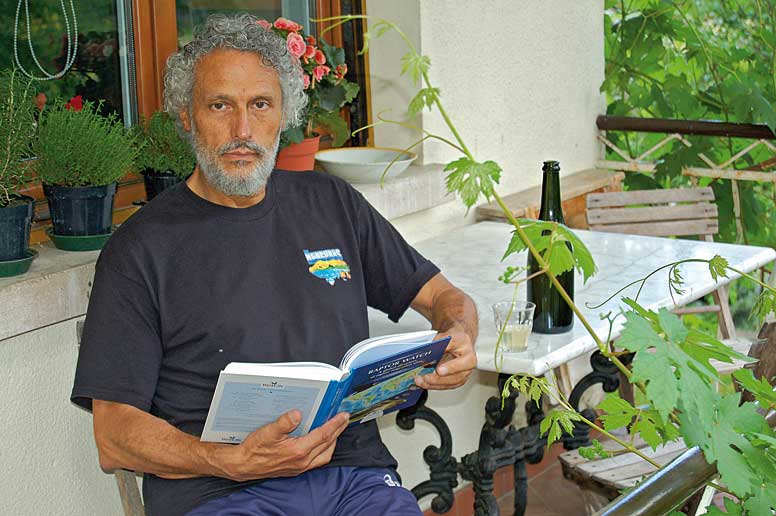
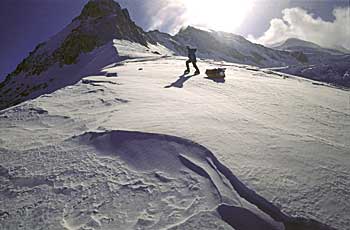 I don’t know if there is a time and a place during which to die, certainly sooner or later we must leave this earth, become something else, perhaps return there. In an interview that I did with Giuliano when he returned from the north of Mount McKinley, where he had once again suffered frozen feet, he answered my question about whether or not it had been worth it, saying: “Yes, despite everything. I have no regrets. We must never have regrets about what we have or haven’t done. In 1991 it was really terrible losing my toes. Now I am more prepared, I know that in one way or another everything will be okay, and I’ll get over this test. The only regret that I have is that from now on I’ll have to be more careful about not getting frozen again”. Yes, I believe that nothing in the world would have stopped Giuliano from living his dreams. I don’t know if there is a time and a place during which to die, certainly sooner or later we must leave this earth, become something else, perhaps return there. In an interview that I did with Giuliano when he returned from the north of Mount McKinley, where he had once again suffered frozen feet, he answered my question about whether or not it had been worth it, saying: “Yes, despite everything. I have no regrets. We must never have regrets about what we have or haven’t done. In 1991 it was really terrible losing my toes. Now I am more prepared, I know that in one way or another everything will be okay, and I’ll get over this test. The only regret that I have is that from now on I’ll have to be more careful about not getting frozen again”. Yes, I believe that nothing in the world would have stopped Giuliano from living his dreams.
He was a great protagonist of Dolomite mountaineering, he did not limit himself to the pathways of our mountains. He sought climbing trails in all directions as well as within himself, not only to make his own adventurous dreams come true, but to seek out the soul of things, the culture of peoples and the experience of living daily life in a different manner, in contact with a wild nature, which was always like a mother for him, a great calling to go. When I asked him if he were afraid of Alaska, he answered: “No, actually that type of environment excites me. 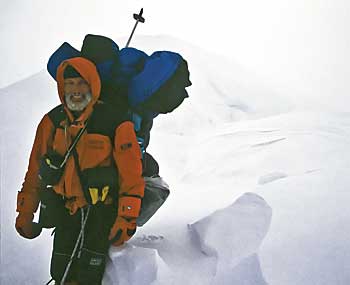 There was nobody around apart from us and remaining in complete solitude, knowing that you must only count on your own strength, adds even more fascination to the adventure”. A challenge? I asked “No. The possibility of still being able to move around solitary places, far from the crowded base camps of the Himalayas, areas where it is still possible to feel a true wilderness inside. These are places where nothing distracts you, where you experience an inner wellbeing, a peace that is otherwise difficult to find in the everyday reality of our cities”. There was nobody around apart from us and remaining in complete solitude, knowing that you must only count on your own strength, adds even more fascination to the adventure”. A challenge? I asked “No. The possibility of still being able to move around solitary places, far from the crowded base camps of the Himalayas, areas where it is still possible to feel a true wilderness inside. These are places where nothing distracts you, where you experience an inner wellbeing, a peace that is otherwise difficult to find in the everyday reality of our cities”.
I don’t know if Giuliano believed in a God, I do know however that on several occasions he made Christ’s teaching his own. In 1991 he saved Fausto De Stefani’s life, giving up on the summit for the third time, despite the fact that it wasn’t far and at the price of having his toes frozen and then having them amputated! He never once boasted about his adventures or his feats, he kept them for himself, as his own travel experiences.
I liked to call him “Socrates”, due to his appearance, which reminded me of a Greek philosopher, and due to the manner in which he interpreted life, due to his balance in not judging others and due to the fact that he never took sides, not because he didn’t have any but because he preferred to keep things to himself. His statuesque physique looked like it had been sculpted by the hand of an able artist, his skin was tanned, his hair curly, mostly grey, his beard too was grey, he was a fascinating man, with a proud yet always willing look.
Giuliano was that Saint Martin who rips off his own cloak to give it to the needy, he would do it without asking himself why, and perhaps it was no chance that he worked in a hospital named after that very saint. I have met very few doctors who followed the teaching of Hippocrates, he was one of them.
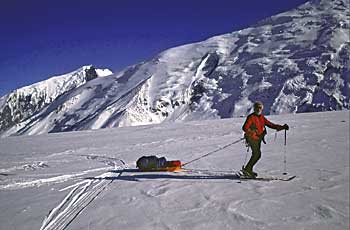 He loved books and films and he really enjoyed travelling. “Journeys are those by sea on boats, not on trains. The horizon must be empty and it must detach the sky from the water. There must be nothing around and you must be able to feel the weight of the immensity above, then these are journeys” Erri De Luca writes in his “Il giorno prima della felicità”. Perhaps we really travel to feel small, humble, of little importance before the greatness of the universe. It is as though we were to become children again and run into the arms of a father who then lifts us up, to carry us on a high towards the wings of a pigeon crossing the road in front of us, and it seems, for a moment of pure lightness, that we can take flight. He loved books and films and he really enjoyed travelling. “Journeys are those by sea on boats, not on trains. The horizon must be empty and it must detach the sky from the water. There must be nothing around and you must be able to feel the weight of the immensity above, then these are journeys” Erri De Luca writes in his “Il giorno prima della felicità”. Perhaps we really travel to feel small, humble, of little importance before the greatness of the universe. It is as though we were to become children again and run into the arms of a father who then lifts us up, to carry us on a high towards the wings of a pigeon crossing the road in front of us, and it seems, for a moment of pure lightness, that we can take flight.
The fear of disappearing is enclosed within that immense emptiness, the fear of getting lost in the sea of existence, of sinking as though into a deep silence, the company of which we cannot bear. This is the great journey, the supreme test, the going to dissolve in all things, feeling part of everything and no longer the master of a body or of something. Becoming, transforming, changing, rather than remaining immobile in a costume that gets older and older day after day and dies with us. Gazing towards the horizon, drowning with a thought in the open sky, getting lost amidst the steps of the day, listening to the echo of our own sensations. I am thinking of Giuliano on the snow of the Antelao, I’m thinking of his words:
“The summit is almost always the end of your emotions in the mountains, but it is not everything. For me, the mountains also mean 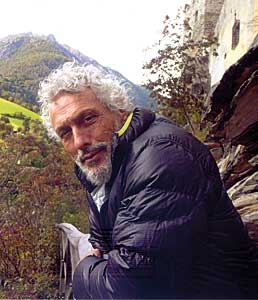 the environment that surrounds me, the place where I can express my physicality, where I can feel an inner wellbeing, find a harmony, a peace with myself and with others. Where I can re-discover and obtain confirmations about everything, even at sixty years of age. It is such an intense and demanding experience from all points of view that it leaves an indelible mark on you. Crossing this granite giant from north to south was an infinite source of joy, I feel a deep sense of enthusiasm, as though I were a child again”. I want to preserve the memory of his face, lost in thoughts and dreams, from the window of the hospital, during a break, as he approaches and observes, looking at the walls and precipices of the Schiàra, then looking up towards Gusèla del Vescovà and from there, projecting his gaze even further, towards another great journey. the environment that surrounds me, the place where I can express my physicality, where I can feel an inner wellbeing, find a harmony, a peace with myself and with others. Where I can re-discover and obtain confirmations about everything, even at sixty years of age. It is such an intense and demanding experience from all points of view that it leaves an indelible mark on you. Crossing this granite giant from north to south was an infinite source of joy, I feel a deep sense of enthusiasm, as though I were a child again”. I want to preserve the memory of his face, lost in thoughts and dreams, from the window of the hospital, during a break, as he approaches and observes, looking at the walls and precipices of the Schiàra, then looking up towards Gusèla del Vescovà and from there, projecting his gaze even further, towards another great journey.
Giuliano De Marchi
Born in Conegliano in 1947, but a Belluno adoptee, he was a urologist at Belluno’s San Martino hospital. He was a member of the central medical committee of the Italian Alpine Club and the Commission of the Ministry for Health for the study of health issues in mountainous regions. He was also a member of the Belluno Alpine Rescue team and an Italian Alpine Club academic. He completed 900 climbs on the Alps and the Dolomites including 70 new trails, winter climbs and solitary expeditions. A series of exciting extra-European activities should then be added to this already impressive carnet, including expeditions to sites all over the world: from the Himalayas to Karakorum, from Alaska to Africa, the Andes and Greenland.
|
|

 I don’t know if there is a time and a place during which to die, certainly sooner or later we must leave this earth, become something else, perhaps return there. In an interview that I did with Giuliano when he returned from the north of Mount McKinley, where he had once again suffered frozen feet, he answered my question about whether or not it had been worth it, saying: “Yes, despite everything. I have no regrets. We must never have regrets about what we have or haven’t done. In 1991 it was really terrible losing my toes. Now I am more prepared, I know that in one way or another everything will be okay, and I’ll get over this test. The only regret that I have is that from now on I’ll have to be more careful about not getting frozen again”. Yes, I believe that nothing in the world would have stopped Giuliano from living his dreams.
I don’t know if there is a time and a place during which to die, certainly sooner or later we must leave this earth, become something else, perhaps return there. In an interview that I did with Giuliano when he returned from the north of Mount McKinley, where he had once again suffered frozen feet, he answered my question about whether or not it had been worth it, saying: “Yes, despite everything. I have no regrets. We must never have regrets about what we have or haven’t done. In 1991 it was really terrible losing my toes. Now I am more prepared, I know that in one way or another everything will be okay, and I’ll get over this test. The only regret that I have is that from now on I’ll have to be more careful about not getting frozen again”. Yes, I believe that nothing in the world would have stopped Giuliano from living his dreams.  There was nobody around apart from us and remaining in complete solitude, knowing that you must only count on your own strength, adds even more fascination to the adventure”. A challenge? I asked “No. The possibility of still being able to move around solitary places, far from the crowded base camps of the Himalayas, areas where it is still possible to feel a true wilderness inside. These are places where nothing distracts you, where you experience an inner wellbeing, a peace that is otherwise difficult to find in the everyday reality of our cities”.
There was nobody around apart from us and remaining in complete solitude, knowing that you must only count on your own strength, adds even more fascination to the adventure”. A challenge? I asked “No. The possibility of still being able to move around solitary places, far from the crowded base camps of the Himalayas, areas where it is still possible to feel a true wilderness inside. These are places where nothing distracts you, where you experience an inner wellbeing, a peace that is otherwise difficult to find in the everyday reality of our cities”. He loved books and films and he really enjoyed travelling. “Journeys are those by sea on boats, not on trains. The horizon must be empty and it must detach the sky from the water. There must be nothing around and you must be able to feel the weight of the immensity above, then these are journeys” Erri De Luca writes in his “Il giorno prima della felicità”. Perhaps we really travel to feel small, humble, of little importance before the greatness of the universe. It is as though we were to become children again and run into the arms of a father who then lifts us up, to carry us on a high towards the wings of a pigeon crossing the road in front of us, and it seems, for a moment of pure lightness, that we can take flight.
He loved books and films and he really enjoyed travelling. “Journeys are those by sea on boats, not on trains. The horizon must be empty and it must detach the sky from the water. There must be nothing around and you must be able to feel the weight of the immensity above, then these are journeys” Erri De Luca writes in his “Il giorno prima della felicità”. Perhaps we really travel to feel small, humble, of little importance before the greatness of the universe. It is as though we were to become children again and run into the arms of a father who then lifts us up, to carry us on a high towards the wings of a pigeon crossing the road in front of us, and it seems, for a moment of pure lightness, that we can take flight. 